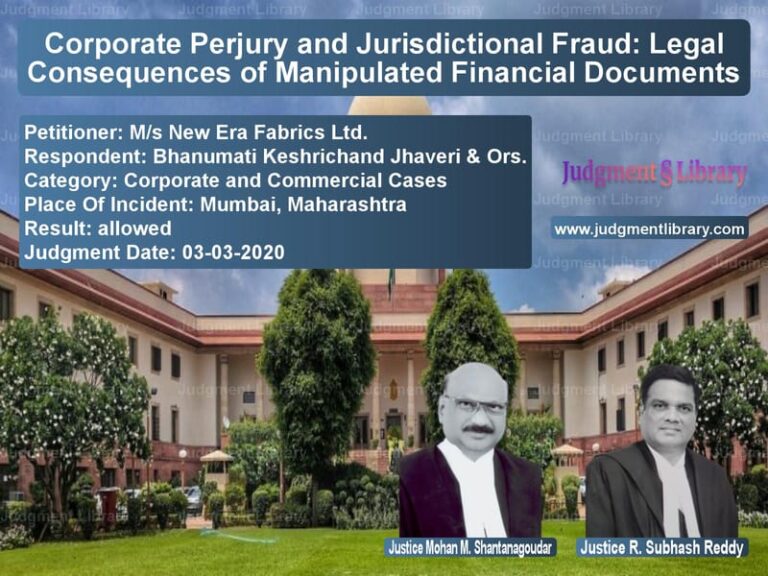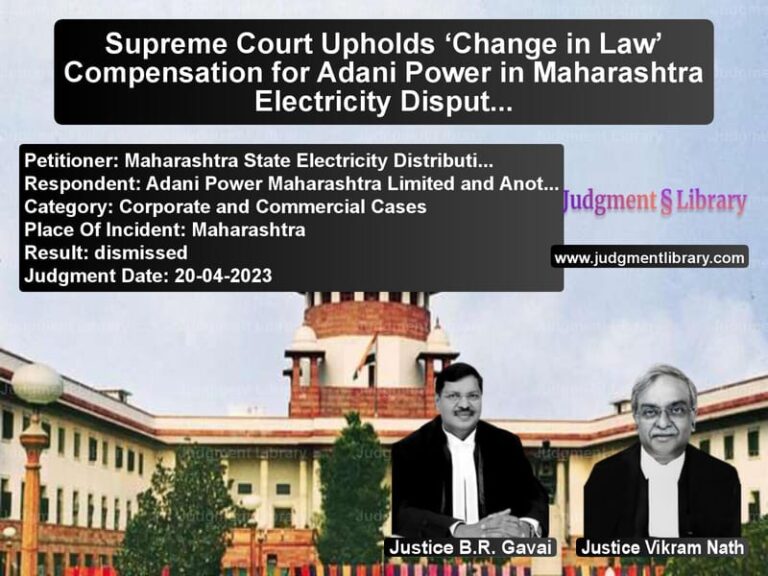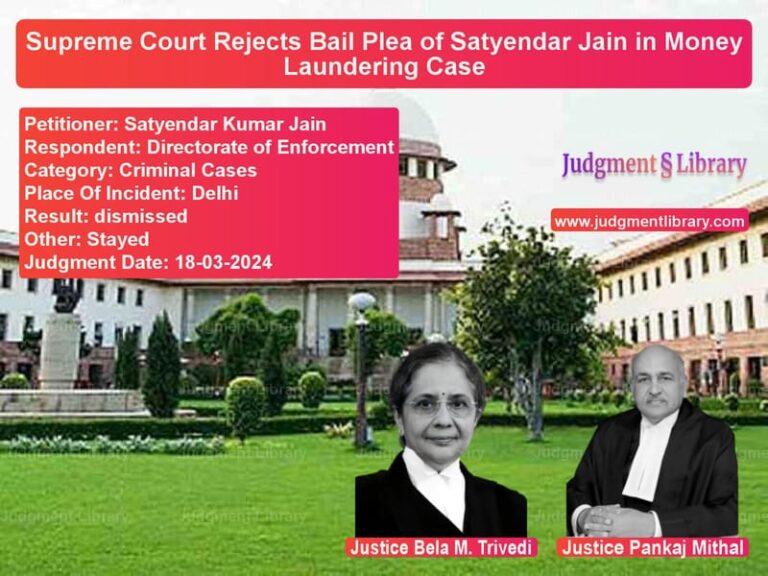Income Tax Appeal Remand: Supreme Court Clarifies Framing of Substantial Questions of Law
The case of Ryatar Sahakari Sakkarre Karkhane Niyamit vs. Assistant Commissioner of Income Tax revolves around the necessity of framing substantial questions of law under Section 260-A of the Income Tax Act. The Supreme Court’s judgment in this case highlights an important procedural requirement for appeals under tax law, ensuring that High Courts correctly frame and address substantial legal questions before deciding on an appeal.
The Supreme Court remanded the case back to the High Court of Karnataka, citing procedural lapses in its earlier decision. The case provides a crucial interpretation of appellate procedures and reinforces the mandatory requirement of framing substantial questions of law before deciding tax appeals.
Background of the Case
The appellant, Ryatar Sahakari Sakkarre Karkhane Niyamit, challenged the Karnataka High Court’s order dismissing a set of income tax appeals. These appeals involved disputes between the assessee (appellant) and the Commissioner of Income Tax (Revenue). While some appeals were filed by the assessee, others were filed by the Revenue.
The High Court had dismissed the appeals filed by the assessee and allowed those filed by the Revenue. Aggrieved by the decision, the assessee approached the Supreme Court through a special leave petition.
Petitioner’s Arguments
The petitioner, represented by Senior Advocate Ms. Anitha Shenai, argued:
- The High Court failed to frame substantial questions of law as required under Section 260-A(3) of the Income Tax Act before deciding the appeal.
- Instead of framing new questions, the High Court merely set out the questions proposed by the appellant and the Revenue in its order.
- The absence of framed substantial questions rendered the High Court’s decision procedurally flawed and legally unsustainable.
- As per Supreme Court precedent, an appeal can only be heard on merits once the High Court has framed substantial questions of law.
Respondent’s Arguments
The respondents, represented by Senior Advocate Mr. K. Radhakrishnan, defended the High Court’s decision by asserting:
- The High Court had sufficiently considered the issues raised in the appeal and was justified in deciding them without explicitly framing substantial questions of law.
- The procedural lapse, if any, was not so significant as to warrant a remand.
- The appeals had been decided on their merits, and a remand would only cause unnecessary delay.
Supreme Court’s Analysis
The Supreme Court extensively examined the procedural requirements under Section 260-A of the Income Tax Act. It referred to its earlier ruling in PR. Commissioner of Income Tax Central-2 vs. M/s A.A. Estate Pvt. Ltd., emphasizing the necessity of framing substantial questions of law before deciding an appeal.
The key legal observations made by the Supreme Court were:
- There is a clear distinction between the questions proposed by the appellant under Section 260-A(2)(c) and the substantial questions framed by the High Court under Section 260-A(3).
- An appeal must be heard only on questions framed by the High Court, not merely on those proposed by the appellant.
- If the High Court finds that the appeal does not involve any substantial question of law, it must explicitly state so and dismiss the appeal in limine.
- Failure to frame substantial questions of law before deciding an appeal results in a procedurally defective judgment, warranting a remand.
Key Judicial Findings
The Supreme Court held:
- The High Court had not framed any substantial question of law under Section 260-A(3) before deciding the appeal.
- Since the appeal was heard without framing the required questions, the judgment was legally flawed.
- The case must be remanded to the High Court for a fresh hearing after framing appropriate substantial questions of law.
- The Supreme Court did not express any opinion on the merits of the case, leaving it for the High Court to decide independently.
Conclusion and Impact
The Supreme Court’s ruling in this case reaffirms the procedural requirements for tax appeals. By emphasizing the necessity of framing substantial questions of law, the judgment ensures consistency and fairness in appellate tax proceedings.
The decision serves as an important precedent for future cases, ensuring that High Courts adhere strictly to procedural mandates under Section 260-A before deciding tax disputes. This ruling reinforces the need for appellate courts to follow due process and prevents arbitrariness in tax litigation.
Petitioner Name: Ryatar Sahakari Sakkarre Karkhane Niyamit.Respondent Name: Assistant Commissioner of Income Tax.Judgment By: Justice Abhay Manohar Sapre, Justice Dinesh Maheshwari.Place Of Incident: Karnataka.Judgment Date: 01-05-2019.
Don’t miss out on the full details! Download the complete judgment in PDF format below and gain valuable insights instantly!
Download Judgment: Ryatar Sahakari Sakk vs Assistant Commission Supreme Court of India Judgment Dated 01-05-2019.pdf
Direct Downlaod Judgment: Direct downlaod this Judgment
See all petitions in Income Tax Disputes
See all petitions in Tax Evasion Cases
See all petitions in Tax Refund Disputes
See all petitions in Judgment by Abhay Manohar Sapre
See all petitions in Judgment by Dinesh Maheshwari
See all petitions in allowed
See all petitions in Remanded
See all petitions in supreme court of India judgments May 2019
See all petitions in 2019 judgments
See all posts in Taxation and Financial Cases Category
See all allowed petitions in Taxation and Financial Cases Category
See all Dismissed petitions in Taxation and Financial Cases Category
See all partially allowed petitions in Taxation and Financial Cases Category







